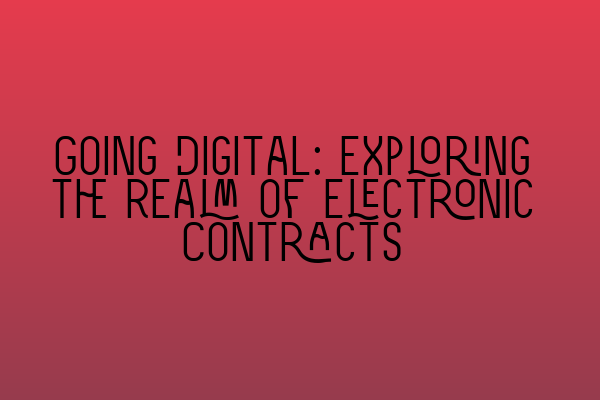Going Digital: Exploring the Realm of Electronic Contracts
In today’s fast-paced and technologically advanced world, it is no surprise that many aspects of our lives are moving into the digital realm. From online shopping to virtual meetings, digitalization has become an integral part of our daily routines. This digital transformation has also extended its reach to the legal field, with electronic contracts gaining significant popularity.
Electronic contracts, also known as e-contracts or digital contracts, are agreements entered into electronically, without the need for physical documents or handwritten signatures. They have become increasingly common in various industries, offering convenience, efficiency, and cost-effectiveness. In this blog post, we will delve into the realm of electronic contracts, exploring their benefits, challenges, and legal considerations.
Benefits of Electronic Contracts
The shift to electronic contracts has brought numerous advantages for businesses and individuals alike. One of the key benefits is convenience. With electronic contracts, parties can access and sign agreements from anywhere, at any time, eliminating the need for in-person meetings or sending physical copies back and forth. This not only saves time but also reduces administrative burdens.
Furthermore, electronic contracts offer enhanced efficiency. The use of automated processes streamlines the contract lifecycle, from negotiation to execution and enforcement. Digital signatures, encryption, and audit trails ensure the authenticity, integrity, and confidentiality of the agreement, providing a higher level of security compared to traditional paper-based contracts.
Cost-effectiveness is another notable advantage of electronic contracts. By eliminating printing, shipping, and storage costs associated with physical documents, businesses can significantly reduce their expenses. Moreover, the accelerated contract lifecycle enabled by digitalization can lead to faster revenue generation and improved customer satisfaction.
Challenges and Legal Considerations
While electronic contracts offer significant benefits, they also come with their fair share of challenges and legal considerations. One of the primary concerns is the validity and enforceability of electronic signatures. In many jurisdictions, electronic signatures are legally recognized and upheld, provided they meet certain requirements, such as being uniquely linked to the signatory, capable of identifying the signatory, and created using reliable technology.
Additionally, the issue of consent is paramount in electronic contracts. Parties must clearly indicate their intention to be bound by the terms of an agreement. This can be achieved through various means, such as clicking an “I agree” button or using specialized e-signature platforms that capture the signatory’s intent.
Another critical consideration is the preservation and accessibility of electronic contracts. As with any legal document, it is essential to keep records of electronic contracts for future reference and potential disputes. Proper storage, encryption, and backup mechanisms must be in place to ensure the integrity and availability of electronic contracts.
It is worth noting that while electronic contracts are widely accepted, certain types of contracts may still require physical signatures or specific formalities to be valid. It is crucial to seek legal advice to determine the requirements applicable to your specific situation.
Moving Forward with Electronic Contracts
As the use of electronic contracts continues to grow, it is essential for businesses and individuals to adapt to this evolving landscape. Embracing digitalization can offer numerous benefits, but it is crucial to approach it with caution and ensure compliance with applicable laws and regulations.
To further prepare for the legal profession and navigate the evolving legal landscape, consider exploring SQE Contract Law courses offered at SQE Contract Law. These courses provide comprehensive preparation for the Solicitors Qualifying Exam (SQE) and cover essential topics, including contract law, legal research, and drafting.
In conclusion, electronic contracts have revolutionized the way agreements are made and executed. Their convenience, efficiency, and cost-effectiveness make them an attractive option in today’s digital world. However, it is crucial to understand the legal considerations and ensure compliance with applicable requirements. By staying informed and embracing digitalization, businesses and individuals can harness the benefits of electronic contracts, contributing to a more efficient and interconnected legal ecosystem.
Related Articles:
– SQE 1 Practice Exam Questions
– SQE 1 Practice Mocks FLK1 FLK2
– SQE 2 Preparation Courses
– SQE 1 Preparation Courses
– SRA SQE Exam Dates
